International
Covid-19: Studies show the effectiveness of cannabis in reducing inflammation caused by the Coronavirus
Published
3 years agoem
By
Laura Ramos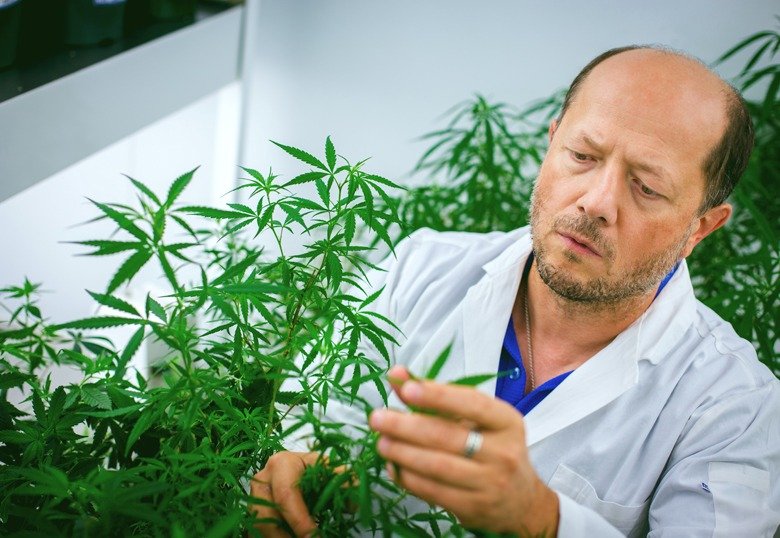
Several preclinical studies show that cannabis, namely CBD and some terpenes, reduce the inflammation caused by Covid-19. Although more research is needed, preliminary results with cannabinoids are promising in the possible treatment and prevention of complications caused by the coronavirus. Cannareporter collected the studies already published and spoke with some researchers to better understand how cannabis works in Covid-19.
The news is not from now. In 2020, a few months after the beginning of the pandemic, several media around the world announced studies that showed promising results in the use of CBD in the inflammation associated with COVID-19, since the Forbes à Jewish Press, passing by VISION and by Correio da Manhã.
Kovalchuk's team pioneered in Canada
O first study was unveiled in Canada, at the Department of Biological Sciences at the University of Lethbridge, through a team of researchers led by Igor Kovalchuk, a pioneering scientist in epigenetics, together with the companies RX Pathways (of which Kovalchuk is CEO) and Swysh, both focused on developing cannabis therapies.
The study concluded that some cannabis extracts with a high CBD content can alter the levels of ACE2 receptors in various tissues, such as the mouth, lungs and intestinal cells, helping to block proteins that act as a gateway for the virus to enter cells. hosts that infect people, reducing entry points by up to 70%. Cannabis extracts helped to reduce inflammation and slow down the virus.
"Let's imagine that the cell is a large building," explained Igor Kovalchuk in a statement. “Some CBD extracts have reduced the number of doors in the building by, say, 70%. That means the entry level will be restricted, so we have a better chance of fighting it.”
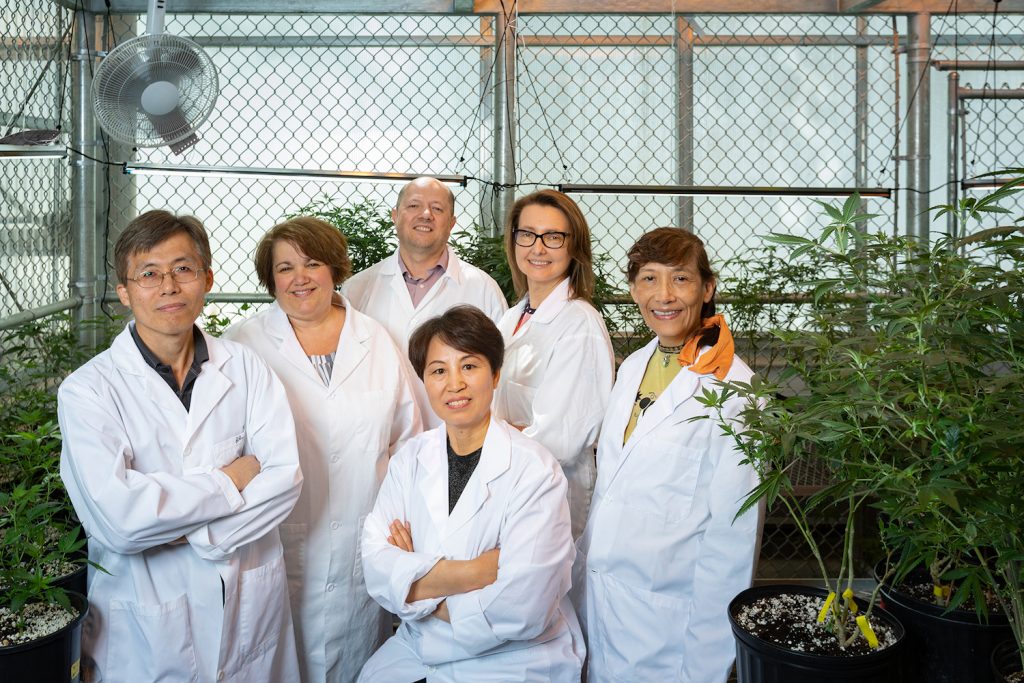
The team led by Igor Kovalchuk at Pathways RX, Canada. Photo: University of Lethbridge, Canada
As far as clinical practice is concerned, these first findings indicate that the extracts can be used in ventilators and/or oral hygiene products, applied both in hospitals and at home. However, the authors warn that these extracts are not easy to find. Over the past four years the team has tested hundreds of extracts, only a small percentage of which have proven to be really effective.
“We identified 13 extracts from Cannabis sativa with high CBD content that decrease ACE2 protein levels. Some extracts down-regulate the serine protease TMPRSS2, another critical enzyme required for SARS-CoV-2 entry into host cells. While our most effective extracts require large-scale validation, our study is important for future analysis of the effects of medical cannabis on COVID-19. Extracts from our new lines of Cannabis sativa The most successful high CBD content, pending further investigation, may become a useful and safe alternative for the prevention/treatment of COVID-19 as adjunctive therapy.” abstract of the study.
Recent research by Kovalchuk reveals the effectiveness of terpenes too
After the first results, Kovalchuk's team plunged into further investigations and published a new study this week, which reveals that some cannabis strains help reduce a specific type of inflammatory stress – called a “cytokine storm” – that occurs in severe cases of acute respiratory distress due to Covid-19.
Cytokines play an important role in the human body's immune responses, but if our body releases a large amount too quickly, they can be harmful. Signs and symptoms of a cytokine storm include a high fever, inflammation (redness and swelling), intense fatigue, and nausea.
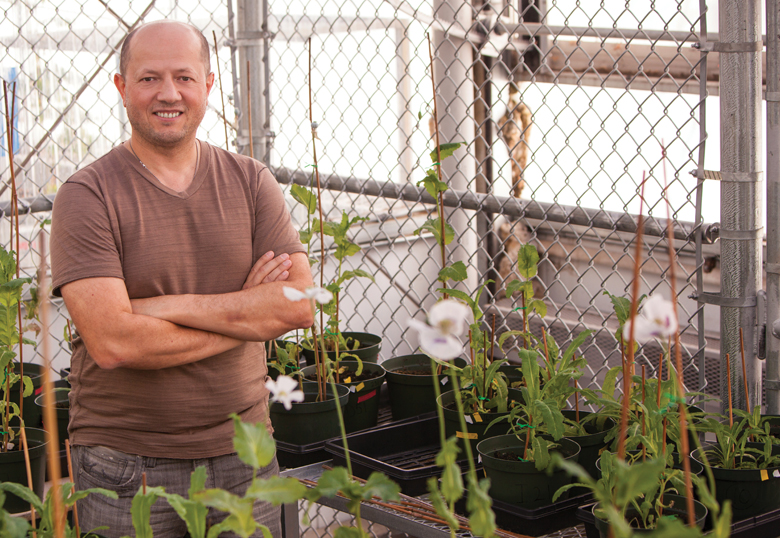
Igor Kovalchuk received the 2013 Agricultural Science Innovation Award from ASTech, Science and Technology Leadership Foundation of Alberta, Canada. Photo: University of Lethbridge
One of the main causes of severe Covid-19, which continues with acute respiratory stress syndrome (ARDS) is precisely the influx of pro-inflammatory cytokines. "Of all the cytokines, TNFα and IL-6 play crucial roles in the pathogenesis of cytokine storm and are likely responsible for the increased severity of the disease," the study says. The inclusion of cannabis extracts in the treatment helped “reduce inflammation, prevent fibrosis and lead to remission of the disease”.
For Igor Kovalchuk this discovery was not a surprise. “Before Covid, we studied the anti-inflammatory effect of more than 100 cultivars (pre-selected from almost 800), identified a few dozen with strong potential and registered several patents on them, for use in Multiple Sclerosis, Rheumatoid Arthritis, intestinal inflammation and skin and oral inflammation.”
The analysis by Kovalchuk's team showed, however, that CBD or THC alone did not have the same effect as whole extracts. "We strongly believe in the full spectrum, probably there are terpenes that contribute and we wrote in the paper that one of those terpenes could be caryophyllene."
Of the seven cannabis cultivars used in this study, three were considered the “most effective”. According to the study, these three varieties helped to “profoundly” reduce inflammatory cytokine storms through a “downregulation of COX2, TNFα, IL-6, CCL2 and other cytokines and pathways related to inflammation and fibrosis.”
However, Kovalchuck cautions that these are not varieties that people can buy in stores, as they are “unique cultivars, created in a lab. They don't exist anywhere and they don't even have a name”, he says, having been named in the study only as #4 or #8, for example.
The study was published in the scientific journal “Aging”, and concluded that “anti-TNFα and anti-IL-6” cannabis extracts, also known as anti-inflammatories, may be useful to treat inflammation not only from COVID-19, but also from various rheumatologic diseases and conditions, inflammatory basis, aging and frailty.
Kovalchuk has grown over 1.500 different cannabis strains and has begun testing them for their anti-cancer and anti-inflammatory biological activity. In this study, the researchers narrowed the cultivars down to seven and tested them using a well-established artificial 3D human skin tissue model.
Cannareporter emailed some questions to Igor Kovalchuk and is awaiting a response.
Israel investigates benefits of CBD and terpenes in Covid-19 on several fronts
Kovalchuk's team was not alone in investigating and discovering the anti-inflammatory effects of CBD on Covid-19. The Ichilov Hospital in Tel-Aviv, Israel, announced, still in April 2020, a clinical trial to investigate whether CBD can slow the inflammatory process that accompanies the deterioration of coronavirus patients and alleviate the symptoms of the disease. Led by anesthesiologist Barak Cohen, the doctor points out that “this is a novel approach to treating some of the symptoms, using a component of the cannabis plant that is considered safe and non-addictive.”
Another Israeli study, the most recent, was peer-reviewed and published in the prestigious international scientific journal Scientific Reports, led by Professor Hinanit Koltai and Guy Mechrez, at the Volcanic Institute, in partnership with the Biological Services Unit at Bar Ilan University. Research concluded that cannabis compounds (CBD) exhibited anti-inflammatory activity vitro in COVID-19-related inflammation in lung epithelial cells and pro-inflammatory activity in macrophages. “Cannabis extracts and fractions reduce the level of IL-8 and IL-6 in the lung epithelial cell model,” the study concludes.
CBD with Terpenes Twice as Effective as Corticosteroids
Also in Israel, Professor Dedi (David) Meiri, a world-renowned cannabis biochemist in the Technion Institute and President and CSO of the company CannaSoul Analytics, together with Nadav Eyal, Co-founder and CEO of Eybna – Terpene based Technologies, recently announced that the companies have teamed up on a new study designed to find out whether cannabis and terpenes can help fight off cytokine storms.

David (Dedi) Meiri, Research Biochemist at the Technion Institute in Israel and CSO at Cannasoul Analytics. Photo: Laura Ramos
The study looks at a proprietary terpene formulation called NT-VRL™, created by Eybna to treat inflammatory diseases such as cytokine storm syndrome found in patients with Covid-19. The formulation contains 30 terpenes, potential anti-inflammatory agents considered generally safe.
Nadav Eyal explains that this method opens up a new world for synergistically effective natural formulations – containing therapeutic capabilities that individual active pharmaceutical ingredients (APIs) will struggle to match.
That is, while most medicines contain only one active ingredient, this formulation contains 30 different ingredients, all of which work synergistically to create beneficial effects, also known as the Entourage.
In addition to the NT-VRL™ terpene formulation, the scientists also tested CBD, CBD with NT-VRL™, and Dexamethasone in their assay. According to the Forbes, Dexamethasone was included because it is a corticosteroid often used to reduce inflammation. In a recent study in the UK, it reduced mortality by a third in hospitalized patients with Covid-19 who used ventilators, and the World Health Organization (WHO) is updating its recommendations to include the use of Dexamethasone or other corticosteroids in cases severe from Covid-19.
In the Israeli study, each compound was tested to see how it affected cytokine activity and the terpene formulation was not only able to inhibit cytokine activity (with better results at higher doses), but also outperformed CBD and Dexamethasone. CBD alone inhibited about 75% of cytokines on average, while terpenes alone inhibited about 80%, suggesting that Eybna's terpene blend may be even more effective than CBD at reducing inflammation.
Still, the best results came from combining CBD with the NT-VRL™ terpene formulation, which was able to inhibit about 90% of the cytokines tested. In comparison, Dexamethasone was able to inhibit only about 30% of cytokines, suggesting that the combination of CBD and terpenes may be 2 times more effective than the treatment currently recommended by the WHO.
Another study carried out in Israel, more specifically at the Department of Medicine at the Sourasky Medical Center in Tel-Aviv, led by Yishay Szekely, once again concluded that natural cannabinoids suppress the cytokine storm in a model vitro similar to sepsis. The paper, published in the European Cytokine Network, demonstrates that “natural cannabinoids significantly suppress LPS-stimulated pro-inflammatory cytokine production in whole blood in a dose-dependent manner. The use of human whole blood, rather than isolated specific cells or tissues, can closely mimic an environment of Sepsis in vivo. These findings highlight the role that natural cannabinoids may play in suppressing inflammation and call for further study of their use as potential new therapeutic agents for acute and chronic inflammation.” abstract.
Several US Universities also focus on CBD research
In addition to Canada and Israel, the United States of America (USA) is also leading research into the benefits of cannabinoids in Covid-19, with several teams in different states and universities researching the effects of CBD on this disease.
Researchers from the University of Nebraska and the Texas Biomedical Research Institute called for more research into how CBD can help treat lung inflammation caused by the new coronavirus, in a study already peer reviewed, on the relevance of adding cannabinoids to anti-viral therapies to reduce SARS-CoV2-induced lung inflammation and respiratory distress. The authors, Siddappa N. Byrareddya and Mahesh Mohan, published the article in the July 2020 issue of the magazine Brain, Behaviour, and Immunity. In the study, scientists explain that CBD has already shown anti-inflammatory properties. in previous studies, does not create the psychotropic effects associated with THC, the most common cannabinoid in cannabis, and has already been approved by the Food and Drug Administration (FDA) as safe for children with refractory epilepsies. "If successful in reducing inflammation for COVID-19 patients, it could be a safer alternative to other anti-inflammatory options," they say.
Another study published in the magazine Cannabis and Cannabinoid Research by researchers from University of Augusta, in the State of Georgia, also shows that CBD can help patients with severe respiratory distress resulting from COVID-19 and can potentially avoid the need for ventilators. The authors concluded that “the results suggest a potential protective role of CBD during acute respiratory distress syndrome that may extend CBD as part of the treatment of COVID-19, reducing the cytokine storm, protecting lung tissues and restoring inflammatory homeostasis. ”.
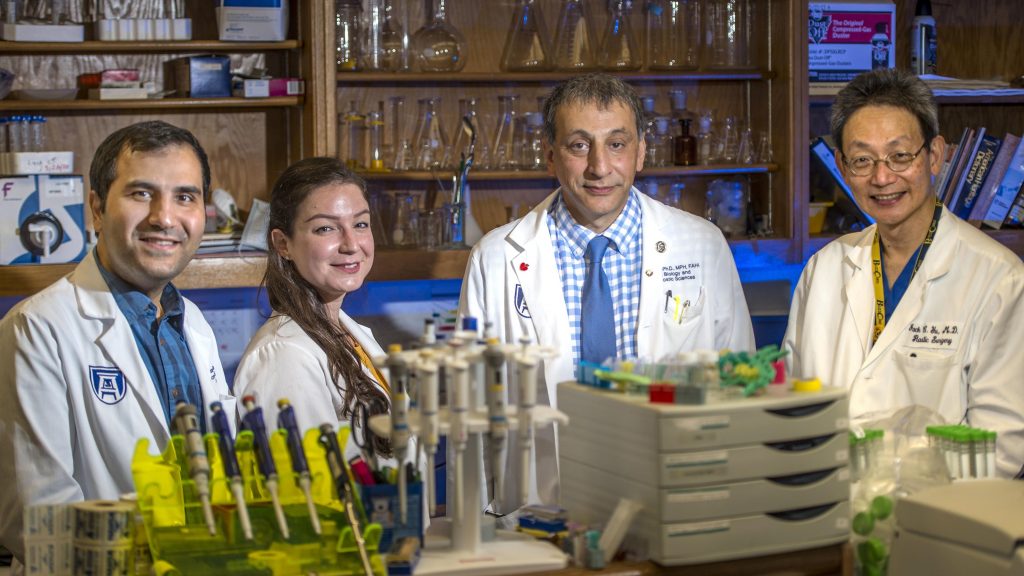
Immunologist Babak Baban and researchers on his team. Photo: The Augusta Chronicle
The team of Babak Baban, Immunologist, Professor and Associate Dean of Research in the Department of Neurology and Surgery at The Medical College of Georgia, University of Augusta, also published another study, in the Journal of Cellular and Molecular Medicine, where he reports that CBD treatment was able to revert the symptoms of ARDS (acute respiratory distress syndrome) to a normal level. “Importantly, CBD treatment increased apelin expression significantly, suggesting that a potential crosstalk between the apelinergic system and CBD could be the therapeutic target in the treatment of inflammatory diseases such as COVID-19 and many other pathological conditions.”
Cannareporter spoke with Barak Baban and publishes a separate interview with the researcher.
In the Biology Department of the College of Science and Health at William Paterson University in New Jersey, Emmanuel Shan Onaivi and Venkatanarayanan Sharma also published the study. “Cannabis for Covid-19: Can Cannabinoids End the Cytokine Storm?”
In their research, they compare Covid-19 with AIDS (AIDS or HIV) and discuss similar possibilities in treatment. “There are still many unknowns regarding COVID-19, but there are also important lessons to be learned from AIDS that are applicable to the COVID-19 pandemic. Both are zoonotic diseases with different modes of transmission, with no vaccine or cure yet; however, there is an effective antiretroviral therapy for AIDS. In addition, cannabis and cannabinoids have been proposed and used as an adjunctive treatment for AIDS-associated cachexia and in reducing the symptoms of the disease. Inflammation processes are important in both the pathogenesis of AIDS and COVID-19. Cannabinoids are effective in suppressing immune and inflammatory functions, and their potential as an anti-inflammatory treatment in COVID-19 has been suggested. As infection with SARS-CoV-2 causes inflammation due to the immune response and a 'cytokine storm', resulting in a range of mild to none symptoms to severe and critical COVID-19-induced comorbidity and mortality, this study discusses the potential of pharmacological immunomodulatory effects of cannabinoids that are constituents of the cannabis plant. It is important to determine the effects of cannabis and cannabinoid use by those who have not contracted the disease and by those who have contracted COVID-19 and the outcomes," Onaivi and Sharma report in the study.
Yet another study, carried out at the Department of Pathology, Microbiology and Immunology at the University of South Carolina College of Medicine at Columbia by Prakash Nagarkatti, published in the scientific journal Frontiers in Pharmacology, in November 2020, dedicated itself to investigating “The use of cannabinoids to treat acute respiratory distress syndrome and cytokine storm associated with coronavirus disease-2019”. The study once again reveals that as cannabinoids are potent suppressors of inflammation, as evidenced by their ability to suppress cytokine storm in animal models, they may serve as novel therapeutic agents to treat cytokine storm and distress syndrome. acute respiratory distress seen in patients with or without COVID-19. "We believe that cannabinoids hold promise as potent anti-inflammatory agents," the authors conclude.
Prakash Nagarkatti had already published a review, in 2010, where it revealed the anti-inflammatory potential of cannabinoids. “Endocannabinoid manipulation and/or use of exogenous cannabinoids in vivo may constitute a potent treatment modality against inflammatory disorders. This review will focus on the potential use of cannabinoids as a new class of anti-inflammatory agents against a range of inflammatory and autoimmune diseases that are primarily triggered by activated T cells or other cellular immune components. abstract.
Brazil advances with clinical trial
The University of São Paulo has advanced with a clinical trial to investigate the effects of CBD in patients with mild to moderate symptoms caused by Covid-19. The National Council for Scientific and Technological Development and the Fundação de Amparo à Pesquisa do Estado de São Paulo, by the hand of the principal investigator José Alexandre Crippa, Head Professor of Psychiatry at the Department of Neurosciences and Behavioral Sciences at the Faculty of Medicine of Ribeirão Preto, from the University of São Paulo. Crippa is coordinator of the Anxiety, Psychogeriatrics and Consultation Services in Mental Health and did his post-doctoral work at the Institute of Psychiatry at Kings College, London, UK, specializing in psychopharmacology.
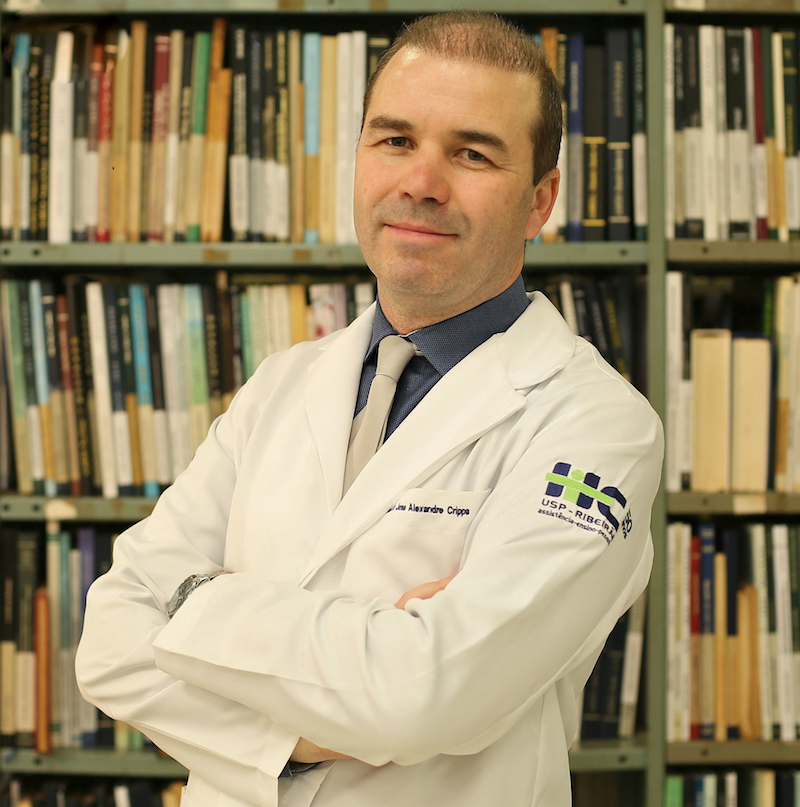
José Alexandre Crippa, principal investigator of the clinical trial that is taking place in Brazil
In this study, the authors write that the aim of their work is to conduct a randomized, double-blind, placebo-controlled clinical trial to assess the efficacy and safety of cannabidiol (CBD – 300 mg daily) in patients infected with SARS-CoV. -two.
The specific objectives were to evaluate whether, in patients with mild and moderate forms of SARS-CoV-2, the daily use of CBD for fourteen days is capable of: i) decreasing the viral load; ii) modify inflammatory parameters, such as cytokines, measured in serum; iii) reduce clinical and emotional symptoms through daily clinical assessment; iv) improve sleep; v) reduce hospitalizations and worsen the severity of the disease; v) Monitor the possible adverse effects of using CBD in these patients.
A total of 104 patients with SARS-CoV-2 infection were included in the study (i.e., 52 cases in the CBD group plus pharmacological and clinical measures and 52 in the placebo group plus pharmacological and clinical measures). All patients received clinical and pharmacological doses standardized by the Brazilian Ministry of Health practice guidelines for diagnosis and treatment of mild and moderate cases of SARS-CoV-2. The clinical trial ended in December 2020, but the results have not yet been released. Cannareporter sent some questions to principal investigator Alexandre Crippa and is awaiting a response.
In Europe, Italy and the United Kingdom stand out in research with CBD in Covid
in Italy, a study led by Giovanni Sarnelli, from the Department of Clinical Medicine and Surgery at the Federico II University of Naples, published in June 2020 in the British Journal of Pharmacology, analyzed the potential of cannabidiol (CBD) in the pandemic caused by Covid-19.

The Federico II University of Naples is one of the oldest in Europe and celebrates 797 years in 2021. Photo: DR | Napoli da Vivere
The study suggests “the hypothesis that cannabidiol (CBD), a non-psychotropic phytocannabinoid, has the potential to limit disease severity and progression for several reasons: – (a) Cannabis sativa with high cannabidiol content are able to reduce the expression of the two main receptors for SARS-CoV2 in various human epithelial models, (b) cannabidiol exerts a wide range of immunomodulatory and anti-inflammatory effects and can mitigate the uncontrolled production of cytokines responsible for acute lung injury, (c) being a PPARγ agonist, it may exhibit direct anti-viral activity, and (d) PPARγ agonists are regulators of fibroblast/myofibroblast activation and can inhibit the development of pulmonary fibrosis, thus improving the lung function in recovered patients”. The researchers hope that their hypothesis, supported by pre-clinical evidence, “inspires further studies aimed at testing cannabidiol as a supportive substance against the Covid-19 pandemic.”
In the UK, the B20 Clinical Neurology Unit at the Queen's Medical Center at the University of Nottingham had already published in 2010 a review of studies leadered by Chris S. Constantinescu who showed the interaction between cytokines, cannabinoids and the nervous system.
The review of studies reveals that cytokines play important roles in neuroinflammation and neurodegeneration and that the Endocannabinoid System (ES), composed of the CB1 and CB2 cannabinoid receptors, endogenous bonds and proteins involved in the synthesis and inactivation of endocannabinoids, participates in the regulation of immune responses of the nervous system. “Activation of the cannabinoid system is associated with therapeutic effects that may be mediated by downregulation of cytokine expression. Here, we review the results of studies on the reciprocal regulation of the immune and cannabinoid systems, which is based on functional and anatomical connections. We then discussed the mechanisms involved in the reciprocal regulation of cytokines and ES”. The article was published in the magazine immunobiology, in a special issue entitled “Cannabinoids and Immunology".
More research and clinical trials are needed
Despite the promising conclusions of these studies, the researchers recommend that more research be done in this area. Much more research is needed to understand the mechanisms of action of cannabinoids in Covid-19 and confirm their effectiveness, in addition to reaching conclusions regarding the type of solutions to use in the treatment.
For now, they all agree on one thing: despite the positive outlook, research is not yet in a position to suggest that cannabis should be considered a cure or treatment for COVID-19 in its own right, only suggesting that it may have potential. to help decrease inflammation and reduce anxiety in sufferers of the condition. Furthermore, the cannabis or extracts used in these studies are obviously not the same as those found in stores or parallel markets around the world, so it is not recommended that people seek treatment with any type of CBD. Finally, after pre-clinical research, there is still a long way to go with clinical trials in humans, but taking into account all this research already carried out, cannabis is definitely a hypothesis to consider to reduce the complications caused by the Coronavirus.
____________________________________________________________________________________________________
[Disclaimer: Please note that this text was originally written in Portuguese and is translated into English and other languages using an automatic translator. Some words may differ from the original and typos or errors may occur in other languages.]____________________________________________________________________________________________________

What do you do with €3 a month? Become one of our Patrons! If you believe that independent cannabis journalism is necessary, subscribe to one of the levels of our Patreon account and you will have access to unique gifts and exclusive content. If there are many of us, we can make a difference with little!
Related News
-
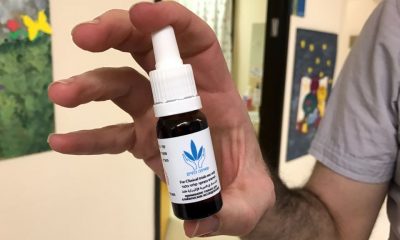

Israel conducts first clinical trial in children with autism
-
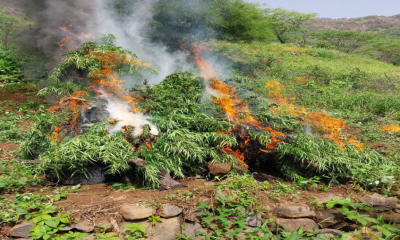

Cape Verde: PJ seizes and incinerates more than 700 kg of cannabis
-


Italy: Sicily launches innovative hemp project to revolutionize agriculture
-


President of Parliament clarifies: “Ghana has not legalized the recreational use of cannabis!”
-
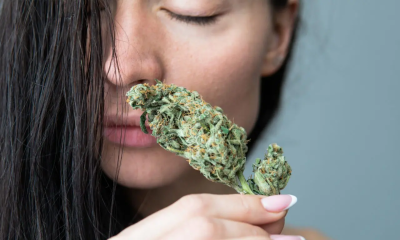

Study says that the aroma – and not the THC – is what counts most in the subjective selection of cannabis
-
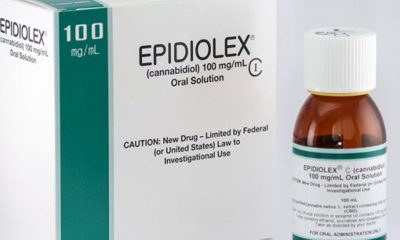

United Kingdom: Epidyolex available for patients with Tuberculous Sclerosis

Mais recentes


Álvaro Covões, who acquired land from Clever Leaves, says he has “no interest in growing cannabis”
At the beginning of April, we reported that Álvaro Covões, founder and CEO of 'Everything is New', had purchased the land where he was located...


Portugal's regulatory advantage in the cannabis industry
In the dynamic landscape of European cannabis cultivation, Portugal has emerged as an interim leader. Although it shares many natural advantages with...


ICBC Berlin shines again. It's the beginning of a new era for the cannabis industry in Germany
ICBC Berlin was the first major international cannabis conference to take place after the legalization of adult use in...


USA: Mike Tyson products recalled for mold contamination
California authorities have issued a mandatory recall notice for two products from Mike Tyson's cannabis brand,...


4:20 is coming and there are celebrations in Porto and Lisbon
The date for celebrating cannabis culture is approaching! This Saturday, April 20th, is the day when...


Paul Bergholts, alleged leader of Juicy Fields, detained in the Dominican Republic
Paul Bergholts, the alleged leader of the Juicy Fields pyramid scheme, has been detained in the Dominican Republic and will be subjected to...


Cannabinoids reveal promising results in the treatment of Borderline Personality Disorder
An investigation carried out by Khiron LifeSciences and coordinated by Guillermo Moreno Sanz suggests that medicines based on...


Juicy Fields case: 9 detained by Europol and Eurojustice. Scam exceeds 645 million euros
A joint investigation conducted by several European authorities, supported by Europol and Eurojust, culminated in the arrest of nine suspects...


Regular cannabis users may require more anesthesia during medical procedures
Regular cannabis users may require more anesthesia during medical procedures to remain sedated compared to...


The future of CBD in Japan: How legal reforms will shape the market
Late last year, Japan took a big step towards cannabis reform after approving...








[…] confirms the benefits of cannabinoids in the disease caused by SARS-CoV-2, already advanced in an investigation carried out by Cannareporter precisely one year ago, in January 2021. The team of researchers led by van Breemen, PhD professor and principal investigator [ …]